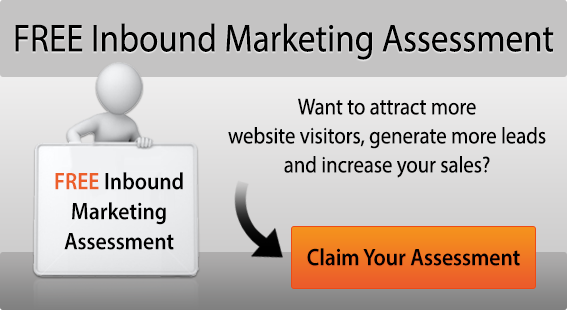Attract The Right Leads With Inbound Marketing: A Small Business Owner’s Guide To Buyer Personas
by Will Williamson on 18-Aug-2022 11:57:00

Inbound marketing isn’t about increasing leads from your website, it’s about attracting more of the right leads –the leads that are most likely to convert to sales, and the potential customers with the best likelihood of spending the most money and sticking around the longest!
This article is all about attracting the right kind of web traffic to your site, and this task largely starts by understanding who your target customers are, what problems they face, what makes them tick, and why they are interested in a service like yours.
The best way to do this is to create a buyer persona for each of the main types of buyer you deal with, which you can use to create targeted content that increases both leads and conversions.
What is a buyer persona?
A buyer persona is a marketing term for an ideal customer type, in other words, the type of person you’d like to get in touch with you through your website, and the sort of person you generally communicate with when making sales. If you’re a B2B business, it’s important to note that your buyer persona is not another business. Your company might do business with precision engineering companies, construction contractors, or solicitors’ firms, but the buyers you deal with are people within these companies, with a certain job role and level of responsibility.
Each buyer persona document is a semi-fictitious, but representative, profile that builds a comprehensive picture of your ideal target buyer, using a series of exploratory questions. This information goes beyond the person’s job role to delve into their motivations, their typical challenges, their online browsing habits, and even their communication style. The more information you include, the more useful your buyer persona will be in tailoring your content to the specific needs of your target audience.
A note on ‘ideal buyers’
Your ideal buyer is someone for whom your products and services, and your business as the service provider, is the perfect fit to resolve their challenges.
These people are strongly compatible with your products and services and your way of working, with considerable overlap in terms of business philosophy, communication style, and ethos. It may not always be love at first sight, but focusing on your ideal buyer demographic ensures you spend your time and resources on people who actually need what you have to offer, and who appreciate working with a company like your own – if you’re a small family business with personalised, face-to-face service as your USP, there’s not much point targeting people who like to do business exclusively online, for instance.
This level of understanding makes the sales process faster and easier for everyone involved and helps create better and more profitable relationships.
It’s inevitable that your buyer personas will, to a certain extent, be modelled on your actual customers, but don’t simply fill the document in from what you know about your current buyers, as these people may not be typical of their buyer group, and they may not be the ideal type of buyer you want to attract.
What to include in a buyer persona
First, give your buyer persona profile a name e.g. Keith the Dishwasher Engineer – this keeps you focused on the fact that the persona represents a real person, not an abstract entity. Almost any information is potentially relevant to a buyer persona, so use the following set of questions as a starter framework and build up the picture from there.
Professional/Work-Based Information
- Job title (make a separate buyer persona for each role)
- Type of company they work in and its size
- Their industry/sector
- Typical career background – University, apprenticeship etc
- Level of experience and technical knowledge
- Who they report to
- Who reports to them
- Roles and responsibilities
- What they do on a typical day at work
- Qualities they value in their professional life
Demographic Information
- Age bracket
- Gender
- Family information (if known) – e.g. whether they are married, have children etc
- Level of education
- Income bracket
- Location
- What they do outside of work
Challenges
- How is success measured at work – e.g. number of sales, project delivery KPIs, revenues etc?
- What are their career goals?
- What challenges do they face in meeting these goals?
- How do they look for solutions and what type of question do they ask?
- What issues do they typically face when finding solutions to their challenges?
- How could you help?
- If they didn’t turn to you, what would they do – e.g. go to a competitor, recruit in-house etc?
Customer Information
- What qualities do they look for in a service provider – e.g. price and expertise?
- What factors are essential – e.g. accreditations, awards, testimonials, X years in business?
- What objections might they have, and what could put them off – e.g. admin fees, long lead time?
- What factors influence their decision-making process – e.g. cost, sign off from their director?
Communication information
- How does the buyer like to communicate – e.g. email, face-to-face, phone, video chat?
- How do they source information – Google, LinkedIn, industry journals etc?
- What social media platforms that they use?
- What industry platforms and forums do the use?
- Do they belong to any professional associations?
- Do they regularly attend any trade events or conferences?
Qualifying Information
- Are you able to meet their expectations?
- Have they got the authority to make a purchase decision?
- Are your products and services within their budget?
- Are they in the right industry for your products and services?
How you can use your buyer personas
Your buyer personas will become the cornerstone of your marketing and sales strategy and have many applications. Most importantly, they allow you to tailor your content to address the concerns of a specific audience and allocate your resources to target the people who are most likely to convert. Understanding your target customers’ communication style, moreover, lets you use language and terminology that connects with them on a personal and professional level.
To find out more about buyer personas and how you can use them to add greater personalisation to your online marketing and sales, please call us today on 01332 215152.
Image source: Unsplash
- Inbound Marketing (SEO, PPC, Social Media, Video) (831)
- Strategy (368)
- Sales & CRM (197)
- Marketing Automation & Email Marketing (190)
- Business Growth (168)
- Website Design (162)
- Hubspot (141)
- Lead Generation (117)
- Google Adwords (100)
- Content Marketing (94)
- Conversion (53)
- Case Studies (49)
- News (47)
- Ecommerce (39)
- Webinars (34)
- SEO (26)
- AI (20)
- Events (19)
- LinkedIn Advertising (17)
- Video (17)
- Video Selling (15)
- Software training (13)
- Niche business marketing (11)
- The Digital Prosperity Podcast (10)
- HubSpot Case Studies (7)
- Facebook Advertising (6)
- Web Design Case Studies (1)
- February 2026 (2)
- January 2026 (12)
- December 2025 (15)
- November 2025 (6)
- October 2025 (17)
- September 2025 (16)
- August 2025 (14)
- July 2025 (14)
- June 2025 (5)
- May 2025 (19)
- April 2025 (15)
- March 2025 (13)
- February 2025 (13)
- January 2025 (8)
- December 2024 (2)
- November 2024 (4)
- October 2024 (21)
- September 2024 (4)
- August 2024 (8)
- July 2024 (14)
- June 2024 (16)
- May 2024 (25)
- April 2024 (15)
- March 2024 (18)
- February 2024 (5)
- January 2024 (10)
- December 2023 (6)
- November 2023 (10)
- October 2023 (13)
- September 2023 (12)
- August 2023 (14)
- July 2023 (13)
- June 2023 (14)
- May 2023 (15)
- April 2023 (13)
- March 2023 (14)
- February 2023 (13)
- January 2023 (15)
- December 2022 (13)
- November 2022 (6)
- October 2022 (8)
- September 2022 (22)
- August 2022 (15)
- July 2022 (13)
- June 2022 (16)
- May 2022 (14)
- April 2022 (16)
- March 2022 (17)
- February 2022 (11)
- January 2022 (8)
- December 2021 (6)
- November 2021 (7)
- October 2021 (11)
- September 2021 (10)
- August 2021 (7)
- July 2021 (7)
- June 2021 (4)
- May 2021 (4)
- April 2021 (1)
- March 2021 (3)
- February 2021 (5)
- January 2021 (4)
- December 2020 (7)
- November 2020 (6)
- October 2020 (5)
- September 2020 (9)
- August 2020 (18)
- July 2020 (17)
- June 2020 (17)
- May 2020 (10)
- April 2020 (21)
- March 2020 (24)
- February 2020 (21)
- January 2020 (12)
- December 2019 (23)
- November 2019 (12)
- October 2019 (14)
- September 2019 (16)
- August 2019 (15)
- July 2019 (13)
- June 2019 (6)
- May 2019 (8)
- April 2019 (4)
- March 2019 (2)
- February 2019 (2)
- January 2019 (2)
- December 2018 (3)
- November 2018 (24)
- September 2018 (11)
- August 2018 (9)
- June 2018 (3)
- May 2018 (6)
- April 2018 (14)
- March 2018 (12)
- February 2018 (16)
- January 2018 (15)
- December 2017 (15)
- November 2017 (18)
- October 2017 (23)
- September 2017 (19)
- August 2017 (28)
- July 2017 (27)
- June 2017 (25)
- May 2017 (18)
- April 2017 (17)
- March 2017 (16)
- February 2017 (17)
- January 2017 (14)
- December 2016 (21)
- November 2016 (27)
- October 2016 (25)
- September 2016 (16)
- August 2016 (20)
- July 2016 (19)
- June 2016 (14)
- May 2016 (20)
- April 2016 (24)
- March 2016 (22)
- February 2016 (28)
- January 2016 (27)
- December 2015 (28)
- November 2015 (19)
- October 2015 (9)
- September 2015 (12)
- August 2015 (5)
- July 2015 (1)
- June 2015 (10)
- May 2015 (3)
- April 2015 (11)
- March 2015 (14)
- February 2015 (15)
- January 2015 (12)
- December 2014 (2)
- November 2014 (23)
- October 2014 (2)
- September 2014 (2)
- August 2014 (2)
- July 2014 (2)
- June 2014 (7)
- May 2014 (14)
- April 2014 (14)
- March 2014 (7)
- February 2014 (2)
- January 2014 (7)
- December 2013 (9)
- November 2013 (14)
- October 2013 (17)
- September 2013 (3)
- August 2013 (6)
- July 2013 (8)
- June 2013 (4)
- May 2013 (3)
- April 2013 (6)
- March 2013 (6)
- February 2013 (7)
- January 2013 (5)
- December 2012 (3)
- November 2012 (2)
- September 2012 (1)
Subscribe by email
You May Also Like
These Related Blogs

What Would a Mobile App Look Like for Your Business?
You hear a lot about mobile apps but if you had one what would it do? A mobile app is rapidly becoming an essential business tool as the huge growth i …

Do Instagram Likes Really Matter?
I have said it before and I will say it again when it comes to social media: even though it may not seem like it sometimes, it’s quality - not quantit …

Four Reasons Why You Should Encourage Word Of Mouth Advertising
While we may live in a ‘digital age’, word of mouth is still one of the most effective ways of getting your business known and building your brand. Th …




